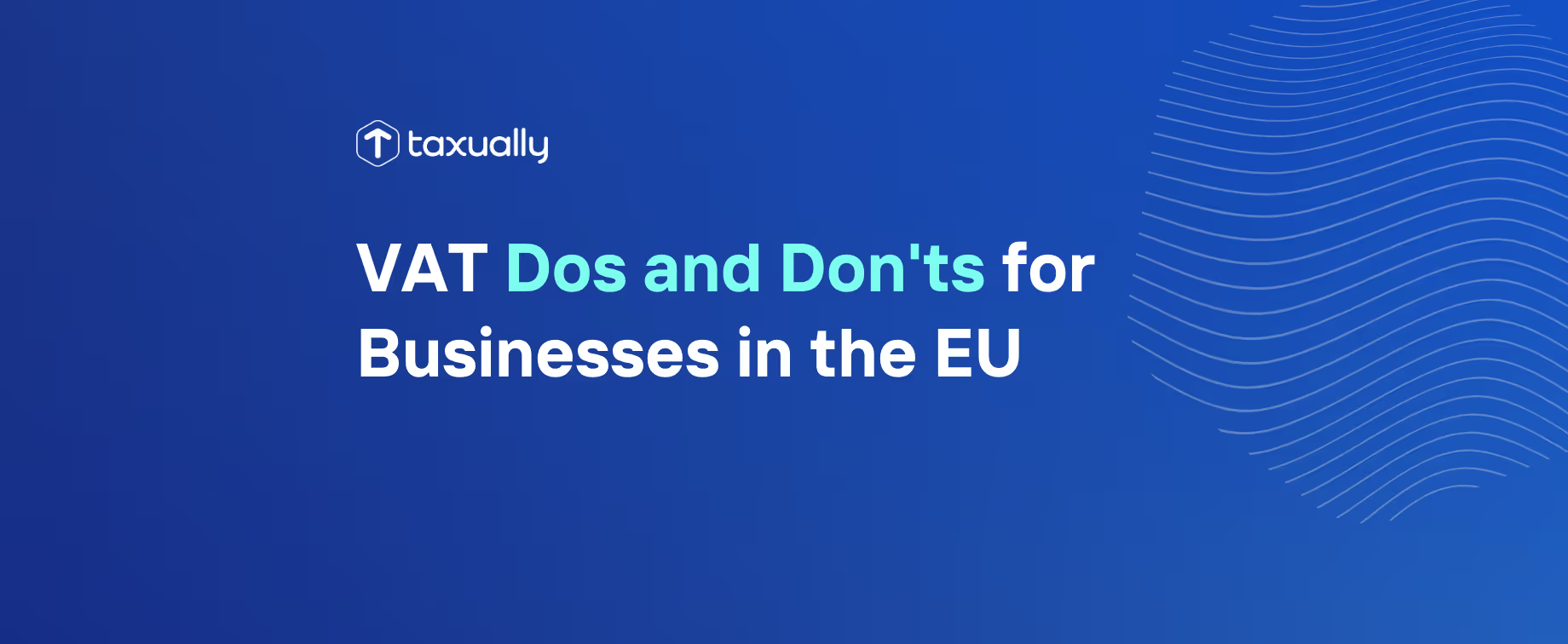Key takeaways
- Know the rules, not just the rates: VAT regulations and rates vary across EU countries—understanding each market’s specific rules is essential for compliance.
- Accuracy matters: Proper VAT registration, invoicing, and record-keeping are vital to avoid penalties and maintain smooth cross-border operations.
- Seek expert guidance: With VAT laws evolving constantly, consulting professionals helps businesses stay compliant and maximize refund opportunities.
Handling the complexities of Value Added Tax (VAT) regulations in the European Union (EU) can be challenging for businesses, particularly those new to the market or looking to expand across borders. VAT compliance is crucial, as errors can lead to penalties, added costs, and administrative headaches. Here’s some VAT advice in the form of dos and don'ts for businesses operating within the EU.
Do: Understand the basics of VAT
Ensure you have a solid understanding of what VAT is and how it works. VAT is a consumption tax placed on a product whenever value is added at each stage of the supply chain, from production to the point of sale. The amount of VAT the user pays is on the cost of the product, less any of the costs of materials used in the product that have already been taxed.
Don't: Assume VAT rates are the same across the EU
One common mistake businesses make is assuming that VAT rates are uniform across the EU. While the EU provides a framework for VAT, rates can vary significantly from one member state to another. It's crucial to research and understand the specific VAT rates and regulations for each country you operate in.
Do: Register for VAT when necessary

If your business exceeds a certain threshold of sales within a country in the EU, you're required to register for VAT in that country. There’s an intra-community distance selling threshold of €10,000 which applies across the EU, but other thresholds vary, so it’s essential to check the specific requirements for each country you do business in.
Don't: Neglect VAT invoices
Proper invoicing is key to VAT compliance. Ensure that your VAT invoices contain all the necessary details required by the local VAT legislation, such as the VAT number, the rate applied, and the VAT amount. Inaccurate invoicing can lead to disputes and potential fines.
Do: Keep meticulous records
Good record-keeping is not just a recommendation; it’s a requirement. You must keep detailed records of all your VAT transactions, including invoices issued and received, import and export records, and documents related to intra-community acquisitions. These records must be kept for a minimum period, usually around ten years, depending on the country.
Don't: Forget about VAT on digital services
The EU has specific VAT rules when it comes to digital services (e-services). If you supply digital services to consumers in the EU, VAT is charged in the consumer’s country, not where the business is based. This means you must charge the appropriate VAT rate depending on your customer’s location and declare those sales in the respective country.
Do: Seek professional advice
VAT legislation can be intricate and is constantly evolving. Seeking advice from a VAT professional or consultant can save you from costly mistakes and ensure compliance. This is particularly important for complex transactions or if you’re expanding into new EU markets.
Don't: Overlook VAT refunds

If you’re incurring VAT on business expenses in a country where you’re not established, you may be eligible for a VAT refund. Many businesses overlook this opportunity to recover costs. Ensure you understand the process and deadlines for claiming VAT refunds in each country.
Conclusion
While VAT compliance in the EU can seem overwhelming, a proactive and informed approach can significantly ease the process. By understanding the basics, keeping up with changes in legislation, and consulting with VAT professionals when needed, you can navigate VAT regulations effectively and focus on growing your business. Remember, in the realm of VAT, what you don't know can hurt you, so stay informed, stay compliant, and leverage the opportunities that the EU market offers.
Do you need help with your VAT compliance? Book a free call with one of our VAT experts to find bespoke solutions for your business, optimize your VAT costs, and reach millions of new potential customers.
Frequently asked questions
New Year's Day - 1/1/2024Memorial Day - 5/27/20244th of July - 7/4/2024Labor Day - 9/2/2024Thanksgiving Day - 11/28/2024Day after Thanksgiving - 11/29/2024Christmas Eve - 12/24/2024Christmas Day - 12/25/2024
Do all EU countries have the same VAT rate?
No. VAT rates vary across EU member states. While the EU sets general guidelines, each country determines its own standard and reduced VAT rates, so businesses must check the rules for every market they operate in.
When does a business need to register for VAT in the EU?
You must register for VAT if your sales in an EU country exceed that country’s threshold. For cross-border ecommerce, the EU-wide distance selling threshold is €10,000, after which VAT registration in the customer’s country may be required.
What should be included on a VAT invoice?
A compliant VAT invoice must list the seller’s and buyer’s details, VAT numbers, the VAT rate and amount, date, description of goods or services, and total amount due. Missing information can result in compliance penalties.
Are digital services subject to VAT in the EU?
Yes. VAT on digital services (like streaming or software downloads) is charged based on the customer’s country of residence, not the seller’s location. Businesses must apply the correct VAT rate and report accordingly.
Can non-EU businesses claim VAT refunds?
Yes. Non-EU businesses may be eligible for VAT refunds on expenses incurred within the EU. Each country has its own application process and deadlines, so it’s important to review the local refund procedures carefully.



















